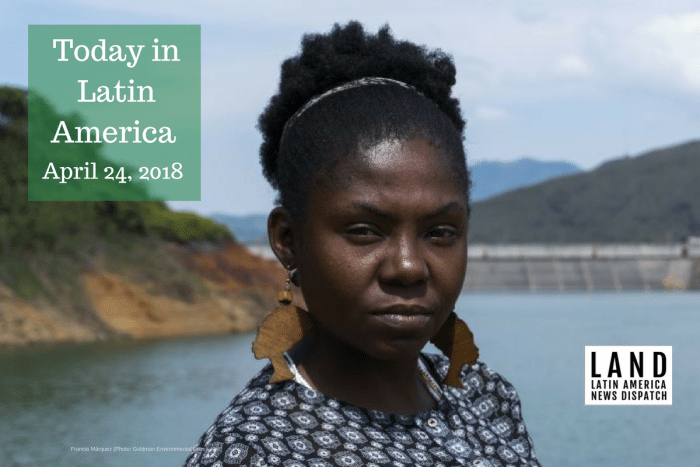

COLOMBIA: Francia Márquez Mina, a 36-year-old Afro community leader from the western Cauca department, won the 2018 Goldman Prize yesterday for her creative defense of ancestral territory. A single mother of two, Márquez led a successful fight to reverse a multinational gold mining concession that would have forced the relocation of her home town of La Toma. Judges on the prestigious “Environmental Nobel” committee also cited a 350-mile trans-Andean march Márquez organized to Bogotá, where she and 80 other women from the village of La Toma mounted a three-week protest. That 2014 action resulted in the creation of a national task force to dismantle an illegal mining network that was poisoning the Ovejas river with mercury and cyanide.
“We know that the territories where we have built community and recreated our culture were not a gift,” Márquez said last night in her acceptance speech, which called for an overhaul of the “economic model of death.” “I am part of a process, of a history of struggle and resistance that began with my ancestors, brought to Colombia as slaves.”
Colombia is the second most dangerous country in the world for environmental activists, especially those from Afro and indigenous communities, according to U.K.-based NGO Global Witness. Like assassinated Honduran indigenous leader and fellow Goldman recipient Berta Cáceres, to whom Márquez paid homage in her speech last night, Márquez has received repeated death threats. She was forced to flee La Toma in 2014 and took the opportunity to enroll in law school, which she temporarily abandoned in order to lead the march to Bogotá. Earlier this year, she ran for Colombian Congress but didn’t get elected.
HEADLINES FROM THE WESTERN HEMISPHERE
NORTH AMERICA
MEXICO: In a German trade fair this April 22, Mexican President Enrique Peña Nieto stated that he is positive about reaching a deal to reevaluate and modernize NAFTA. German Chancellor Angela Merkel agreed to commence discussions about amending the two decade-old trade deal with between Mexico and the European Union. Overhauling NAFTA with the United States and Canada, however, still has its challenges. The U.S. receives roughly 75 percent of Mexico’s exports and provides 50 percent of its imports.
MEXICO: The remaining 600 people of the Central American caravan continue to march north in hopes of receiving asylum in Mexico or the United States. This past weekend, they arrived in the northern city of Hermosillo by train and organizer Irineo Mujica said they expected to reach Tijuana by the end of the week. In a statement released yesterday, the Secretary of Homeland Security said that members of the caravan seeking asylum “may be detained while their claims are adjudicated efficiently and expeditiously, and those found not to have a claim will be promptly removed from the United States.”
THE CARIBBEAN
PUERTO RICO: Foreign consumer banks are slashing branches in Puerto Rico. The two largest international consumer banks, Scotiabank and Banco Santander, have reduced their subsidiaries from 10,723 and 12,821 in 2012 to 6,271 and 9,241 in 2017, respectively, their share of Puerto Rico’s bank branches tumbling down to 16 percent. After seeking bankruptcy relief in 2017, the banks’ exodus adds to the archipelago’s economic and financial woes.
TRINIDAD AND TOBAGO: The United Nations Refugee Agency released a statement condemning the repatriation of Venezuelan nationals by the government of Trinidad and Tobago over the weekend. Under the premise that this was a “voluntary” migration exercise, on April 21 the Trinidadian government sent back 82 Venezuelan asylum-seekers to the South American country, breaching international refugee law. Edmund Dillon, Trinidad and Tobago’s Minister of National Security, said that no single Venezuelan was “compelled or coerced into leaving the country.”
CENTRAL AMERICA
NICARAGUA: Amid ongoing political protests over a now-cancelled social security reform, American diplomatic employees and their families are being pulled out of Nicaragua. Yesterday, the U.S. Embassy in Managua closed its operations. Diplomats and their families were flown back to the United States. Additionally, the U.S. State Department issued a travel warning.
THE ANDES
VENEZUELA: Chevron workers arrested last week could face treason charges over a procurement dispute with Venezuela’s state-oil company PDVSA. The arrests, the first carried out against a Western firm, came amid a deepening dispute between PVDSA and its foreign supply partners. The employees reportedly refused to cooperate with no-bid contracting procedures that have been linked to widespread corruption. If charged, they could face up to 30 years in prison.
PERU: Authorities issued arrest warrants yesterday for two suspects in the lynching of a Canadian accused of killing indigenous shaman elder Olivia Arévalo. Sebastian Woodroffe, 41, had traveled to the Amazon to learn about plant healing. He was beaten and hung on April 19 after Arévalo was found shot to death. The suspects were said to have appeared in a cell phone video taken at the scene. Authorities are investigating claims Woodroffe was involved in Arévalo’s killing, the latest in a series of attacks against indigenous environmentalists in Peru.
GOT NEWS? Send the editors tips, articles and other items for inclusion in Today in Latin America to tips@latindispatch.com.
Want to receive Today in Latin America direct to your inbox? Sign up here.


